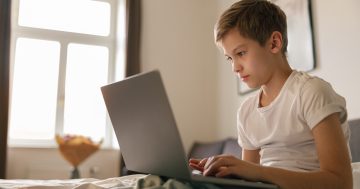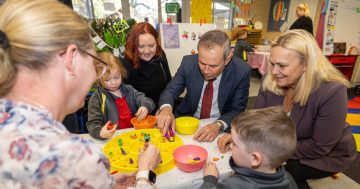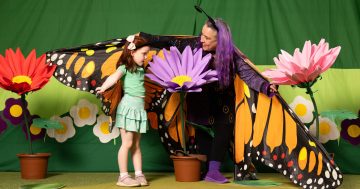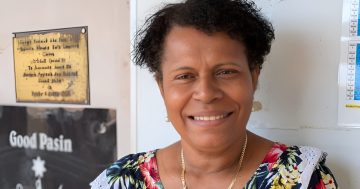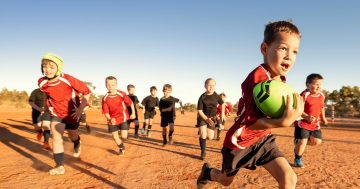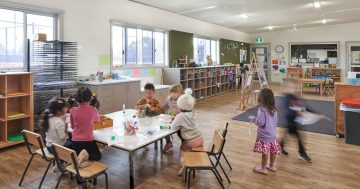Kym Agius* reports on an experimental pilot program to encourage Australian kids back outdoors to play.
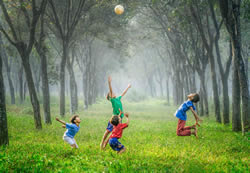
Photo: Robert Collins
Playing outside with the neighbours used to be a natural part of childhood, but some kids are discovering that finding friends isn’t as easy as it used to be.
Six-year-old James Turnbull went on the hunt for playmates in his new estate, north of Brisbane, but blinds were drawn, garage doors closed and fences locked — there was only a hum of airconditioning.
Things have changed compared to when his mum was a kid — now, just 8 per cent of kids play outside each day, with many children glued to screens inside their homes.
But an experiment is under way to change just that, and James is one of its leading stars.
Nature Play has designed and run a pilot program, funded by the Queensland Government, to recreate the sort of childhoods that were enjoyed a generation ago — where kids roamed free.
“The disappearance of the neighbourhood is a new thing and has only come in the last 30 years,” said Nature Play Program Manager, Hyahno Moser.
“Our generation of parents remembers a childhood which starkly juxtaposes what the current modern childhood is, which is mostly indoors, sedentary, technologically immersed, risk-averse and fearful,” Mr Moser said.
The pilot, which cost $66,000, was run over the second half of last year but its findings are yet to be delivered to the Government.
Two Caboolture estates, Riverbank and Rangeview, were selected — James was chosen to lead his community and Mayla Ward, 7, was chosen to lead hers.
Families within the estates met for the first time.
Kids walked to each other’s homes and then rode their bikes.
The last get-together was a “danger” play date led by the kids, where creeks, bushland and even stormwater drains were explored.
Mr Moser said overcoming parents’ fears was one of the biggest challenges.
He said time-poor parents tuck their children safely away inside the fence line, where there was no chance of being hit by a car or abducted.
“Parents are marinating in fear, but given the choice, I’m fairly confident kids will go back to their neighbourhoods,” he said.
More time indoors, on screens
A quarter of Australian children aged 5 to 14 are now overweight or obese, and less than one in five Australian children get their recommended 60 minutes of physical activity each day.
Furthermore, about one-third exceed the two-hour recommended cap on screen time.
Experts are concerned children are also missing out on the complex social interactions that come from playing with friends outdoors.
Psychologist and lecturer at Sunshine Coast University Dr Rachael Sharman said children who do spend time playing outside with other kids have better “executive function”, such as forward planning, insight and using creative plans to work towards a goal.
She said they also had better sleep and greater resilience.
“They’re learning lots of skills around emotion recognition, communication, team building and problem solving, and don’t want Mum and Dad helicoptering in and solving all their problems for them,” she said.
Learning to let go
Mayla’s mother, Marissa Ward wanted her daughter to be part of the pilot so she would appreciate and protect the natural world.
Despite their participation in the program, Ms Ward said she still cannot lose sight of Mayla just yet.
“With all the media and the way things are portrayed it makes things sound a lot scarier,” she said.
“But through this process of slowly getting out more, and watching them grow, it’s made me a lot more confident.”
Mayla said she feels safe playing outside and is ready to go out on her own.
“Then we can play our own games and then maybe we can make up a new game,” she said.
“Then, if we do something wrong, we can fix it up and when it’s all finished, we can show Mummy.”
After participating in the program, James can now roam free — to an extent, according to his mother.
“I can still be in the kitchen doing my stuff, and I know that he is okay out there because the people on the street are looking out for each other,” she said.
While the kids in the pilot programs aren’t exactly free range yet, Nature Play will be sending its results to the Government later this year.
It hopes the results will be good enough to get more funding to run the program in other suburbs.
“This isn’t a three-year problem,” Mr Moser said.
“It won’t be solved on an electoral term.”
“It is an investment we have to make for our children’s future from here and onwards.”
How Nature Play builds unsupervised outdoor play:
- Walk to your neighbours and say hi.
- Make a plan and set a goal with kids.
- Hold a local street play day.
- Create a regular play date.
- Walk or ride to neighbourhood kids’ houses.
- Walk in the neighbourhood with children, let them lead.
- Ride with kids in the neighbourhood, teach them road safety.
- Explore the wild spaces.
- Be consistent.
- Plan to not be there.
* Kym Agius is a digital producer for the ABC in Queensland.
This article first appeared at www.abc.net.au.



